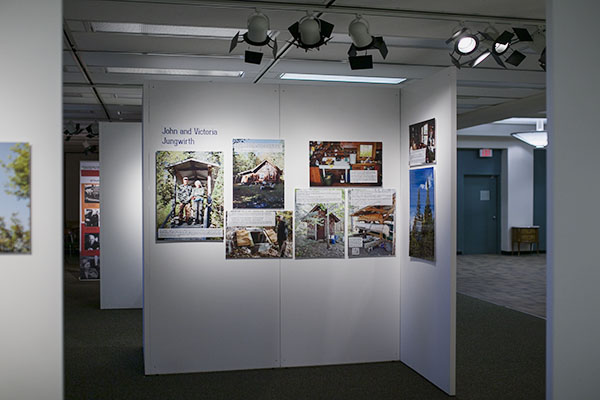Nearly 40 people visited the Beaumier Heritage Center on Saturday afternoon for the ‘‘Living Off the Grid” exhibit, presenting the ways some people live off the land and why they choose to do so.
The exhibition focuses on the growing movement towards a more natural standard of living in the U.P and its roots in both Native American and early pioneer living in the region. There are photographs on display in the Beaumier that show the homes of some people living out in the woods and also include passages about why each person chose a more simplistic means of life.
Director of the Beaumier Heritage Center Daniel Truckey, said that he chose this particular exhibit because it focuses on people who are making a distinct choice to live a self-sustainable lifestyle.
“When we talk about the grid, people talk a lot about the grid meaning electricity, but the grid is also communications. The grid can be considered education, food and water.”
Many people deal with the idea of being off the grid in their very own way. For some people, it could mean returning to a more natural production of food, and for others it could mean converting to a more simple electric system like the use of solar panels.
Living off the grid isn’t a new concept. It’s been growing steadily in the U.S. and throughout the world during the last 60 years.
However, some may simply choose to live this way while many others may not have a choice. Over the last couple of decades, the movement has become more popular among young people who may be looking for an alternative to living in a rapidly advancing technological civilization.
Truckey said that people have been living this way for centuries but got away from it because of the comforts provided by technology. Now some people are choosing to come back to this lifestyle because it is a simpler way to live and is more sustainable. On the other hand, the majority might be too busy with work to gather their own resources like food and other commodities.
“On a planet where we’re using a lot of resources and they’re not infinite, we need to start thinking of ways to live simpler and within our means, especially in a place like the U.P where it’s a challenge because we don’t have a lot of resources here.”
In terms of survival, people in the U.P. who live on their own means found it easier to do so because they made it the top priority to sustain themselves in that way. Some of them say that although it took a lot of patience and some sacrifices, when they actually prioritized their actual needs from wants in life, it wasn’t that difficult for them to maintain.
Married couples like John and Victoria Jungwirth have been living off the grid in the U.P. since 1989 and feel like the trade-off for a less-than-lavish lifestyle is worth it.
“We’ve given up a lot but we’ve gained immensely,” Victoria said.
The affordability of solar panels has made it easier for people to build homes and to live off just the land using their own individual panels.
Electricity is the most challenging resource to get an abundance of during the winter so LED lighting and small electrical appliances within the household are used as ways of conserving electrical energy. With an appropriate number of solar panels though, electricity can be stored by batteries, which can then be used in the winter versus using oil or gas to power generators.
The constant conservation of energy is the trade-off for people who are choosing to live more naturally. Some potential challenges to this lifestyle are the lack of technological comforts and the fact that more time is put into the daily necessities of living.
More time consumption on the gathering of food, energy and water leaves less time available for leisure, but not all view this sacrifice as a drawback. Some see the trade-off of leisure for hands-on work as a positive.
George Lundquist and his wife Julie have also been living off the grid in the U.P since ‘89, and he thinks the extra work that comes as a result of living a more secluded lifestyle can be fun and meaningful.
“I would say you have to want to live out here,” Julie said. “You have to be a little different.”






















